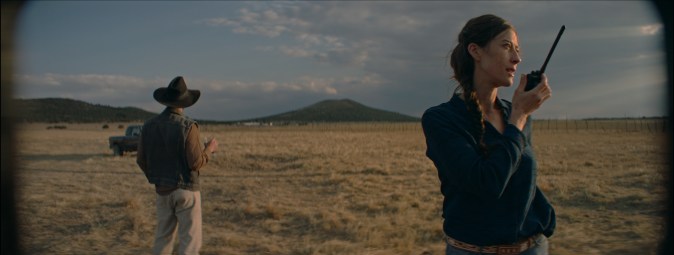You won’t find Carlos Reygadas on social media any time soon. The Mexican auteur responsible for some of the most controversial, formally daring, and philosophically complex art house films to come out of the country over the last two decades, finds the now ubiquitous applications unpleasant. “I personally detest them and they don’t interest me,” he told Remezcla while in Los Angeles for the 2018 AFI Fest, where he presented his new thought-provoking movie Nuestro Tiempo (Our Time).
Technology, however, does play a part in his latest interpersonal drama in which Juan (played by Reygadas himself) and his wife Ester (Natalia López, Reygadas’ real-life spouse) hit a bump in their open relationship when she begins hiding the text messages she receives from an American man she’s having a secret affair with.
The strained couple lives on a ranch with their three children (Reygadas and López’s own kids) and raises fighting bulls. Juan, also an accomplished poet, attempts to re-establish communication with Ester verbally and eventually in writing, yet their incompatible needs and desires create an invisible wall between them.
Casting himself and his family, says the director, was a practical decision since the project would take several years to complete, and having his family be part of it facilitated the process. It was not, as some spectators have assumed, a gimmick based on a desire to expose his private life or investigate his own marriage.

“People can’t understand that the fact that I appear on screen with my wife is only a triviality, they think it’s a constitutive element of the film. I don’t think it’s that way,” he said.

Reygadas also refutes the generalized belief that Our Time is trying to make a statement about a power struggle between men and women in romantic relationships, a reading that he’s encountered more often on this side of the border. “The film is about the contradictions of human beings, more than the idea of possession or control as many have mentioned, especially in the United States.”He believes Americans have an agenda of public discussion driven by guilt and trendy topics, which they try to impose onto international cinema not governed by those ideas.
“Here in the US people have told me that this movie is about machismo, and I don’t understand in what sense it’s about machismo.” According to Reygadas, if one analyzes the demands of different feminist waves in regards to storytelling the movie is not sexist because it fulfills all the requirements. “You never see the woman subjected to any domestic labor, she doesn’t take care of the kids any more than the husband does, the man doesn’t tell her what she has to do, and doesn’t try to subjugate her,” he insisted.
Although Juan does spy on Ester as he feels threatened by her sexual escapades with a gringo, the Cannes-winning filmmaker believes spying on someone is not about machismos, but about human weakness and insecurity. “I’ve noticed that in the United States the movie has been seen through this lens, and I think that deviates from the most human aspects of the film. It’s not a battle of the sexes but a battle these people have within themselves.”
Displaying the unseen rural beauty of the state of Tlaxcala, Our Time boasts awe-inspiring cinematography that captures the shifts between placid weather and tempestuous storms in the region. The rawness of the images is elevated by the ethereal quality of the light – a characteristic element of Reygadas’ work.
Ever since he made his debut, detractors have questioned the way he uses the medium and have deemed his efforts as pretentious or undecipherable. He sees this pushback as people’s inability to see Mexican cinema as being more than straightforward narratives. “When I made Japón people would ask me why I had done a film with metaphysical vibes, like if Swedish or Russian directors had a monopoly on making those kind of movies,” he recalled.

Japón, his first feature about a suicidal middle-aged man and his elderly sexual partner, will soon be added to the Criterion Collection via a Blu-ray release with new extras.
Though they often depict sordid or provocative subject matters, Reygadas’ works don’t deal with drug trafficking or other tropes that have become commonplace in Mexican moviemaking. For him, retelling those tired stories only perpetuates the very stigmas Mexicans are trying to get rid of. “In Mexico, it seems we have to make comedies or movies about narcos and violence. If we only produce that then we become victims of our own clichés,” said Reygadas.
The mind behind bold titles such as Luz silenciosa (Silent Light), Batalla en el cielo (Battle in Heaven), and Post Tenebras Lux is also puzzled by the audience’s conviction that directors have all the answers about their movies. What he likes to do, with Our Time and all the entries in his filmography, is create a vessel for people to bring their own ideas about the situations or elements he’s presented them with. But he is aware that so much freedom can feel like a burden since we’ve all been trained to seek exact and irrefutable causality for what we see on screen. Nevertheless, he is not changing his artistic pursuit.
“Some people get upset because they don’t understand why things happen, when in real life we often don’t know why things happen even to those who are closer to you,” he pointed out. “What people desire the most in cinema is clarity, objectivity, non-ambiguity, and I’m not interested in that.”
This interview was conducted in Spanish and translated to English by the author for Remezcla.




